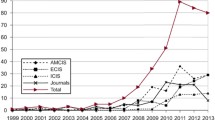Abstract
This paper seeks to identify a new and useful role for systems thinking in improving qualitative research quality. Firstly, it reflects upon the main characteristics and difficulties of qualitative research. Secondly, it critically reviews some of the techniques suggested to improve research credibility, transferability, dependability and confirmability. Thirdly, it explains the concept of pattern-matching and its role in designing case studies. Based on these, the paper examines the pattern-matching role of systems thinking in enhancing the trustworthiness of qualitative research. Finally, a case study is described to illustrate how pattern-matching is embedded in systems perspective to improve research trustworthiness. The paper highlights that when systems thinking is combined with pattern-matching properly in qualitative research, it can help the investigators to develop a fuller and richer understanding of a phenomenon, and can enable others interested in the research to recover how conclusions have been made and to make informed judgement about the research findings.
Similar content being viewed by others
References
Al-Busaidi K, Olfman L (2005) An investigation of the determinants of knowledge management systems success in omani organizations. J Global Inform Technol Manage 8(3):6–28
Anderson V, Boocock G (2002) Small firms and internationalisation: learning to manage and managing to learn. Human Res Manage J 12(3):5–25
Campbell D (1969) Reforms as experiments. Am Psychol (24):409–429
Campbell D (1975) Degrees of freedom and the case study. Comp Polit Stud 8(2):178–193
Cao G (2001) Systems thinking and managing organisational change. PhD Thesis, The University of Luton
Cao G, Clarke S, Lehaney B (2004) The need for a systemic approach to change management—a case study. Syst Pract Act Res 17(2):103–126
Checkland P, Holwell S (1998) Action research: its nature and validity. Syst Pract Act Res 11(1):9–21
Chiles T, Meyer A, Hench T (2004) Organizational emergence: the origin and transformation of Branson, Missouri’s musical theaters. Org Sci 15(5):499–520
Churchman C (1971) The design of inquiring systems. Basic Books, New York
Churchman C (1979) The systems approach and its enemies. Basic Books, New York
Creswell JW (1994) Research design: qualitative and quantitative approaches. Sage, London
Decrop A (1999) Triangulation in qualitative tourism research. Tourism Manage 20:157–161
Easterby-Smith M, Thorpe R, Lowe A (1991) Management research. Sage, London
Flood RL (1995) Solving problem solving. John Wiley & Sons, Chichester
Gregory W (1996) Strategies for underpinning critical systems thinking. In: Flood RL, Romm R (eds) Critical systems thinking—current research and practice. Plenum Press, pp 37–62
Gummesson E (1991) Qualitative methods in management research. Sage, London
Habermas J (1976) Communication and the evolution of society (English ed., 1979) Heinemann, London
Habermas J (1984a) The theory and communicative action, volume one: reason and the rationalisation of society. Polity Press, Cambridge
Habermas J (1984b) The theory and communicative action, volume two: the critique of functionalist reason. Polity Press, Cambridge
Hefferman T, Farrell M (2005) The impact of culture on early international relationship development in the education sector. J Asia Pac Market 4(1):17–41
Hyde K (2000) Recognising deductive processes in qualitative research. Qual Market Res 3(2):82–89
Hussey J, Hussey R (1997) Business research. Macmillan, London
Ke W, Wei K (2006) Understanding e-government project management: a positivist case study of Singapore. J Global Inform Technol Manage 9(2):45–62
Kohn K. 2005) Idea generation in new product development through business environmental scanning: the case of XCar. Market Intell Plan 23(6/7):688–705
Langley A (1999) Strategies for theorizing from process data. Acad Manage 24(4):691–711
Lee T, Mitchell T, Wise L, Fireman S (1996) An unfolding model of voluntary employee turnover. Acad Manage J 39(1):5–37
Lincoln Y, Denzin N (1994) The fifth moment. In: Lincoln Y, Denzin N (eds) Handbook of qualitative research. Sage, Thousand Oaks, CA, pp 575–586
Lincoln Y, Guba G (1985) Naturalistic inquiry. Sage, London
Lo K, Lamm F (2005) Occupational stress in the hospitality industry—an employment relations perspective. N Z J Emp Rel 30(1):23–48
Manz C, Bastien D, Hostager T (1991) Executive leadership during organizational change: a bi-cycle model. Human Resou Plan 14(4):275–288
Mårtensson P, Lee A (2004) Dialogical action research at omega corporation. MIS Quarterly 28(3):507–537
Midgley G (1992) Pluralism and the legitimation of systems science. Syst Pract 5:147–172
Miles MB, Huberman AM (1994) Qualitative data analysis: an expanded sourcebook. Sage, London
Ogden J (2006) Supply base reduction: an empirical study of critical success factors. J Suppl Chain Manage 42(4):29–40
Paul D, McDaniel R (2004) A field study of the effect of interpersonal trust on virtual collaborative relationship performance. MIS Quarterly 28(2):183–228
Pauwels P, Matthyssens P (1999) A strategy process perspective on export withdraw. J Int Marketing 7(3):10–38
Ross J, Staw B (1993) Organizational escalation and exit: lessons from the Shoreham nuclear power plant. Acad Manage J 36(4):701–733
Seale C (1999) The quality of qualitative research. Sage, London
Thomas J, Gourley G, Mele N (2005) The availability of behavioral health services for youth in the juvenile justice system. Am Psychiatr Nurses Assoc 11(3):156–163
Thompson F, Perry C (2004) Generalising results of an action research project in one work place to other situations: Principles and practice. Eur J Mark 38(3/4):401–417
Ulrich W (1983) Critical heuristics of social planning: a new approach to practical philosophy. Haupt, Berne
Walsh K (2003) Qualitative research: advancing the science and practice of hospitality. Cornell Hotel Restaur Adm Q 44(2):66–74
Yin R (1984) Case study research: designs and methods. Sage, Beverly Hills
Yin R (1993) Applications of case study research. Sage, London
Yin R (1994) Case study research: designs and methods. Sage, London
Author information
Authors and Affiliations
Corresponding author
Rights and permissions
About this article
Cite this article
Cao, G. The Pattern-matching Role of Systems Thinking in Improving Research Trustworthiness. Syst Pract Act Res 20, 441–453 (2007). https://doi.org/10.1007/s11213-007-9069-1
Published:
Issue Date:
DOI: https://doi.org/10.1007/s11213-007-9069-1




